Heads up — This got long. Depending on your email server, you might need to click through to the online version in order to see the entire thing if you are inclined. Full Disclosure: There is not a picture of Rusty The Farm Dog at the end this time, so you can make that decision accordingly. I’ll make up for it next time with more Rusty pictures and maybe even a story about the Easter Skunk.
📍THE POPE
Seeing the news on Monday morning, I texted my boys -
We went to Maui and it burned, we went to North Carolina and it flooded, we went to Rome, which I thought was safe because it’s already old and crumbled, but now the Pope is dead. What’s gonna happen to Las Vegas?? should we warn them?? 😬
I’m pretty sure that it’s safe to travel with us, but if you do - you might want to also leave with us.
One of my favorite memories from our trip to Rome in January was getting up early with my boys on Sunday morning and walking over to St. Peter’s Basilica where we toured the Basilica and climbed the stairs as high as we could go.
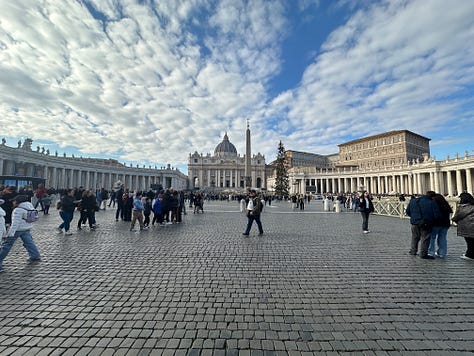


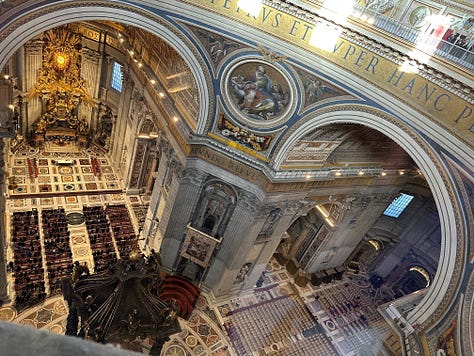
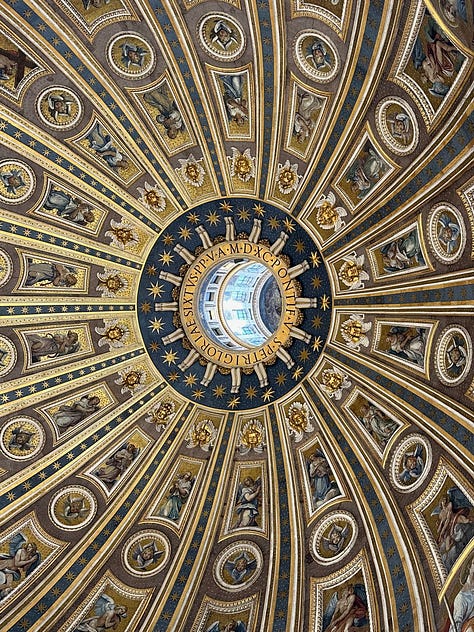
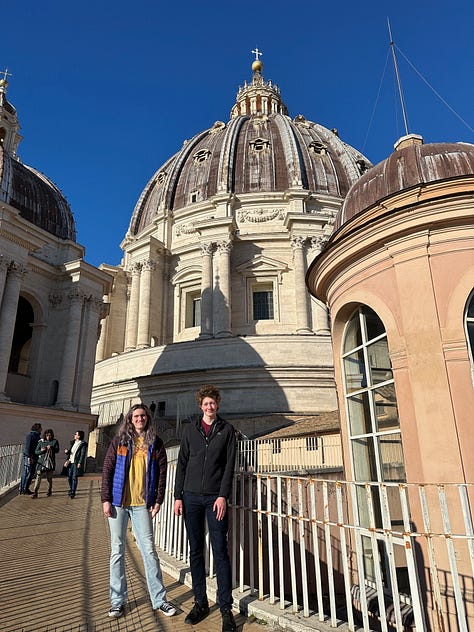


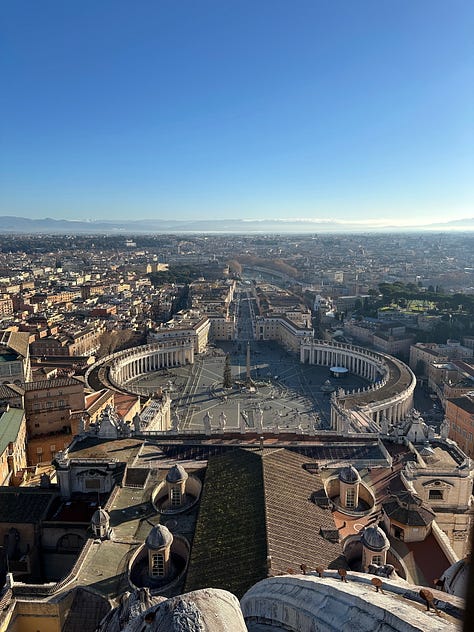
Way back in 2013, shortly after Pope Francis assumed his role, I read and bookmarked an article in USA Today that opens:
ROME (AP) — Pope Francis washed and kissed the feet of a dozen inmates at a juvenile detention center in a Holy Thursday ritual that he celebrated for years as archbishop and is continuing now that he is pope. Two of the 12 were young women, a remarkable choice given that the rite re-enacts Jesus' washing of the feet of his male disciples.
The Mass was held in the Casal del Marmo facility in Rome, where 46 young men and women currently are detained. Many of them are Gypsies or North African migrants, and the 12 selected for the foot-washing rite included Orthodox and Muslim detainees as well, news reports said…..
and the article concludes:
"It shows the all-embracing love of Christ, who ministered to all he met: man or woman, slave or free, Jew or Gentile," he [Rev. James Martin] said.
After the Mass, Francis greeted each of the inmates and gave each one an Easter egg.
"Don't lose hope," he said. "Understand? With hope you can always go on."
I don’t have many reasons to tune to the Pope and his work in my regular life, but this opening act caught my attention and I haven’t forgotten. It became the thread on which I hung stories I heard about this man during his tenure and as I read people’s reflections of him this week, it seems the thread runs through.
In his posting this week, James K.A. Smith writes: Pope Francis showed the world something about God that angry, exclusive, doctrinaire forms of Christianity have suppressed and forgotten: that God is Love.
"Don't lose hope," he said. "Understand? With hope you can always go on."
📍COLLECTED THOUGHTS ON JUDAS
A few years ago I discovered the BBC Radio production of Dorothy Sayers’ series of plays on the life and death of Christ — The Man Born to Be King — and have listened to it in the days leading up to Easter every year since. Turns out I am basically C.S. Lewis1 😆—
Lewis enjoyed her play cycle so much that he read the plays in the year when her book was released and then every Holy Week thereafter. In fact, his first letter to her, on May 30, 1943, contained high praise:
Dear Miss Sayers—
I’ve finished The Man Born to be King and think it a complete success. (Christie the H.M. of Westminster told me that the actual performances over the air left his 2 small daughters with “open and silent mouths” for several minutes).
I shed real tears (hot ones) in places: since Mauriac’s Vie de Jesus nothing has moved me so much. I’m not absolutely sure whether Judas for me “comes off”—i.e. whether I shd. have got him without your off-stage analysis. But this may be due to merely reading what was meant to be heard. He’s quite a possible conception, no doubt: I’m only uncertain of the execution. But that is the only point I’m doubtful on. I expect to read it times without number again….
Yours sincerely
C.S. Lewis (Collected Letters, II, 577f)
And just like Lewis, 🙃 I am picking up on the Judas thread
and following it here…..
Because also in the couple weeks leading up to Easter this year, David and I were watching seasons 3 and 4 of the television series The Chosen.2 Marinating in these dramatizations of the Gospels, alongside hearing readings and sermons from the lectionary texts embedded in the church calendar during Lent, I have lately been hanging out with Jesus and the characters he spent time with, framed within the historical context in which they all lived.
There’s so much going on in the Jesus story and the action gets kinda crazy-making in his final week when emotions for all the players are running fast and hard and stakes are so high. What does he mean when he says I have come so that you might have life?? This miracle-worker who sees into the heart of people and tells stories about a Kingdom that does not match the one where they live. The excitement and fear, the hope and the risks…..and there in the midst of it all is Judas, striking a deal in exchange for a bag of money.
What was Judas thinking? This man who’d been captivated by Jesus and his message. Judas, who seemed to have a particular understanding and hope for the possibilities of a new kingdom. What did he think? What were his motivations? Dorothy Sayers portrays him as a complex character and up until Season 4 in The Chosen he is played as a guy like the rest of Jesus’ close followers — responding to the call of this man who tells stories and speaks of a new way, and they each seem to be doing their best to make sense of what it all means.
I listened to N.T. Wright address the question of motivation in a Q&A podcast entitled Was Judas predestined to betray? Wright says —
….. if you want to say did Judas have free will, I'll say of course he did, but it's more complicated than that. He certainly has responsibility and responsibility implies that there were probably dozens and dozens of moments where he just lingered on the possibility that maybe things might be thus, rather than this way, and so on until finally, whether out of disappointment or ambition or greed or whatever, he tips over.
….And that's the mystery of the cross that it is both the wickedest thing that human beings ever did and the most amazingly loving thing that God did…..
Poor Judas gets caught in the middle of that……
Judas. The man who gave shape to the world in exchange for thirty pieces of silver.
In the aftermath of my car accident, we received a large insurance settlement intended to compensate for losses. But in that accident, I suffered a brain injury that changed the way I navigate through the world and among other things, it took my teaching career. It changed the trajectory of our family’s future. I am grateful for that bag of money we received, but it was not enough and it never ever could have been. What was lost in that moment of collision was value without price.
I listened to Bishop Hooper’s song Judas a lot last week3.
What have I done?
Oh my God what have I done?
Morning breaks and in the sunlight
My mistakes are laid bareHere holy man
Take the silver pull the plan
These coins are poison in my hands
He is innocent and fair
Thirty pieces slave in price
Son of God betrayed and I’ve
His blood on my hands…..
Take the silver, pull the plan. I used to think of Judas as a character flat to the page. Whatever his motivations were, he betrayed Jesus and connected some dots in the Jesus story. Then, realizing his mistake, he killed himself. The end.
I no longer think what happened with Judas and what it means is straightforward obvious, and through the weight of my own life, ever increasing as the years stack up, I feel the weight of his. The gospels don’t give us much to work with other than the basic facts I just recounted. Judas was a man with hopes and dreams for his life and for the world within the culture he is set but we can’t know his particulars with a simple read through. We do know that he is a follower of Jesus, close-in. And through the gospel accounts, we can follow trails of what this must have meant for him. But his story comes to a screeching halt in a gut wrenching sequence of events. And the gospel writers do not give Judas the scenes of repentance and forgiveness that Peter gets.
As I read the flat page text now, it comes alive. I feel excruciating pain as Judas realizes his mistake. The truth and consequence of his miscalculation — these coins are poison in my hands.
And Poor Bishop’s lyrics continue —
I’d give my life if I could trade
I don’t know if it works this way
But would you forgive me
Would you forgive me.
Oh Judas!!! Did you cry out those words?
or in your broken mind, broken body, broken heart, were these words made from your very flesh?
and in that soul-crushed moment, did Jesus, the Word made flesh, meet you there and speak you on to life??
In his Unspoken Sermons George MacDonald writes about the forgiveness Jesus spoke for his killers at the scene of the cross, and from that context MacDonald writes:
….I think, when Judas fled from his hanged and fallen body, he fled to the tender help of Jesus, and found it—I say not how. I believe Jesus loved Judas even when he was kissing him with the traitor’s kiss, and I believe that he was his Savior still.
I am not a theologian. This is not meant to be a position statement on the system of salvation — other than to say what I have long believed: God is not a system. Rather, God is love. And God’s love is expansive. It widens and widens and widens more. The workings of love reach to the edges of my imagination and go beyond.
This week my sister pointed me to a reading from Bread and Wine: Readings for Lent and Easter in which Madeleine L’Engle tells this story4 —
There is an old legend that after his death Judas found himself at the bottom of a deep and slimy pit. For thousands of years he wept his repentance, and when the tears were finally spent he looked up and saw, way, way up, a tiny glimmer of light. After he had contemplated it for another thousand years or so, he began to try to climb up towards it. The walls of the pit were dank and slimy, and he kept slipping back down. Finally, after great effort, he neared the top, and then he slipped and fell all the way back down. It took him many years to recover, all the time weeping bitter tears of grief and repentance, and then he started to climb up again. After many more falls and efforts and failures he reached the top and dragged himself into an upper room with twelve people seated around a table. “We’ve been waiting for you, Judas,” Jesus said. “We couldn’t begin till you came.”
This reminds me of something I read in The Brother’s Karamazov5 a couple months ago where the intellectual brother Ivan, a self proclaimed atheist, is speaking with the devil in a hallucinatory scene. As the two go back and forth about the existence of God and what it matters, the devil tells Ivan a story about
a certain wise man and philosopher who ‘rejected everything, laws, conscience, faith,’ and especially, any future life. He died, expecting to go directly into darkness and death, but lo and behold, there lay before him — a future life. He was utterly surprised and indignant: ‘This,’ he says, ‘contradicts all my belief.’
And that’s exactly what he was punished for…that is, you see….He was punished and condemned to walk a quadrillion kilometers in the darkness; and when he’d finished walking that distance, they’d open the heavenly gates for him and all would be forgiven.
Upon receiving this sentence,
The condemned man stood still, looked around, and lay down in the middle of the road: ‘I won’t go on; I won’t continue on grounds of principle!’
He lay there on those grounds/that ground for almost 1000 years. 😆 Until the day he stood up and got back on the road again.
Boy-oh! do I resonate with this.
I don’t want to do…...
I don’t want to believe….
I don’t want to forgive…….
I don’t want to wait…..
I don’t want to let go…..
The things don’t add up…..
It’s all too hard and
I don’t want to.
Here is a photo of Rusty demonstrating what it is to just stop right here on principle. Though he can’t help his sweet, pleading grin at the same time, the weight of his refusal is real —
When I read this scene in Dostoevsky’s novel I immediately thought of the animation of a song by Avi Kaplan6, which I’d seen on Victoria Emily Jones’ Art and Theology blog this spring —
I seek the water
I seek the trees
I seek the heavens
I'm brought down to my kneesYeah, I know anger
I know peace
Yeah, I know darkness
Mmm, and it knows me…..
Jones notes in her blog entry —
Kaplan, who is Jewish, wrote on Facebook,
“It Knows Me” is an extremely personal song to me. I believe that everyone has a darker side of them, and that you can choose to play into that, or you can choose to not. This song is about that battle between those two forces…..
This makes so much sense to me. Awhile back I was talking to my uncle about someone we know who has made some surprising life choices, taking a seemingly dark turn in the search for self and place in this world. As we talked, my uncle said to me ….we all have the potential to take such turns anywhere along our way.
And yet -
To circle back to Dostoevsky’s walking man story —after 1000 years the man stood back up.
And walked the quadrillion kilometers!!
and when he finally arrived at the gates of paradise —
he just entered, and before two seconds had passed….he exclaimed that those two seconds were worth walking not just a quadrillion kilometers but a quadrillion quadrillion, raised to the quadrillionth power! In a word, he burst into hosannas….
The journey had brought him to this place.
We’ve been waiting for you, Judas,” Jesus said. “We couldn’t begin till you came.”
I don’t know how it all works. Obviously.
But I find something gorgeous and true to my experience in these stories. I saw a poem7 by Luci Shaw posted on Substack a couple days ago and screenshot it here —
Jon Guerra has a song I’ve listened to a lot in this season —
…..Blessed are the guilty who have nowhere to go
For their hearts have a road to the kingdom of God
And their souls are the songs of the kingdom of God
And they will find a refuge for theirs is the kingdom of God
I ran across this painting by artist Susheila Williams8 this week that feels like the appropriate punctuation for this post.
You can read more on their friendship and discussion of The Man Born to Be King here: https://www.cslewis.com/c-s-lewis-and-the-man-born-to-be-king/
I have not seen Season 5 yet, but read this review right before watching Season 4, episode 2. I clicked a link in the article and unintentionally ended up in the midst of some spoilers that I’m actually glad I discovered ahead of time. A fictional plot choice in that episode created what I find is a distracting storyline for the next episodes and has frustrated me quite a bit, but also served up some interesting stuff to consider. David and I have kept on watching to the end of Season 4 and it’s been worth it.
This is from a collection of songs that use prophetic biblical passages which find fulfillment in Mathew’s gospel. You might be interested in seeing the work and footnotes here.
The essay is published online at Plough and you can read it here —https://www.plough.com/en/topics/culture/holidays/meditations-for-lent/waiting-for-judas
Book 11, IX Ivan Fyodorovich’s Nightmare (Michael Katz translation)
Avi Kaplan was the original vocal bass of the a cappella group Pentatonix, from 2011 to 2017. Folksy, hippie, lumberjack energy is how he is described by one of the commenters re: this video and I love that - it’s my speed.
I do not own the volume this poem comes from, but I think it is from her collection Polishing the Petoskey Stone: New and Selected Poems
Susheila Williams, a scholar, painter, and music enthusiast, draws on her native language and culture to express Tamil Christianity in India. She uses her education, privilege, and biblical faith to improve the lives of women, especially those who are most marginalized……more at https://worship.calvin.edu/resources/articles/susheila-williams-using-arts-express-tamil-christianity-india





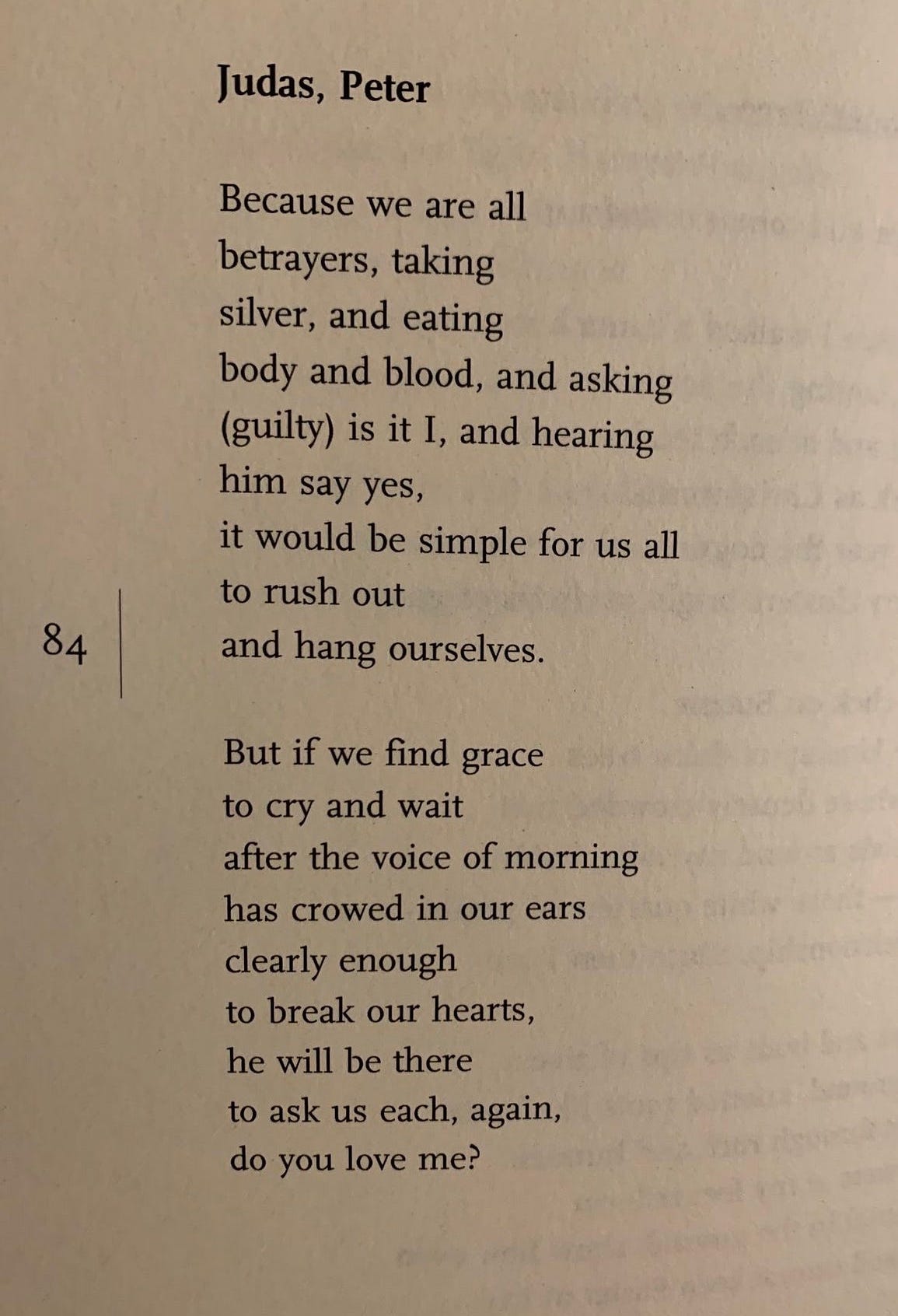

Thank you, Jennifer!